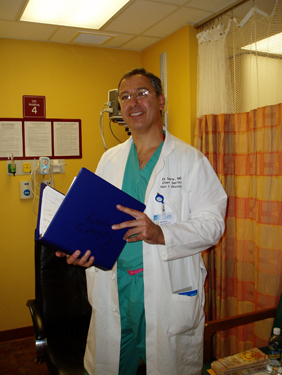New York Methodist Hospital Offers Laparoscopic Gynecology
Nov 27, 2006
In the United States, more than 600,000 women undergo hysterectomies (the removal of the cervix or uterus) each year, making it one of the most common surgeries performed today. Although the majority of hysterectomies are elective procedures, many women undergo the surgery as a necessary treatment option against serious illnesses such as uterine fibroids, abnormal uterine bleeding and uterine or cervical cancer. While hysterectomies can be effective at treating gynecological diseases, at New York Methodist Hospital some women have an alternate, minimally invasive option known as a laparoscopic assisted vaginal hysterectomy. Unlike traditional surgery, which involves a large abdominal incision, the procedure uses a laparoscope, a thin telescope-like device attached to a video camera, which is inserted through a small incision into the navel. The laparoscope allows the physician to perform the procedure through tiny incisions while carefully examining the inside of the pelvis, using computer-guided imagery.

Eli Serur, M.D., the new director of minimally invasive laparoscopic gynecologic surgery at New York Methodist Hospital.
"Performing the procedure laparoscopically allows patients to anticipate a shorter recovery time, fewer scars and less pain, compared to traditional hysterectomies," said Eli Serur, M.D., who recently joined NYM as director of minimally invasive laparoscopic gynecologic surgery. "Within two to three weeks of surgery, most patients are able to return to a fully functional lifestyle," he said.
A hysterectomy is not the only procedure that benefits from a laparoscopic approach. Laparoscopic surgery can be used to diagnose and treat early gynecological oncology cases as well as patients with benign problems such as ovarian cysts, extensive internal scaring and pelvic pain. "As technology advances, we are able to offer patients more modern ways of diagnosing and treating problems that otherwise involved extensive surgery and recovery," said Dr. Serur, who has performed over 2000 laparoscopic surgeries in the past 16 years.
"Dr. Serur's experience in this area helps to support our already strong staff and provide women in the community with an alternative to traditional surgery that they may not have known about before," said Vincent Pillari, M.D., chairman of the Department of Obstetrics and Gynecology at NYM.
Dr. Serur will also be closely involved in educating the Hospital's Department of Obstetrics and Gynecology residents on laparoscopic surgery techniques. "It is important that physicians become comfortable with laparoscopic procedures so that they can accurately inform patients about their options, thus providing the best possible care," said Dr. Serur.
While laparoscopic gynecological procedures are not for every woman, they are preferred for patients who are a high risk for surgery complications, such as elderly women and those with diabetes. "Overweight patients who suffer from diabetes have a 10 to 15 percent chance of wound infection with regular surgery," said Dr. Serur. With laparoscopic procedures, that number drops significantly making it a safer and more effective alternative to surgery.
Patients who undergo a laparoscopic gynecological procedure are able to eat and drink postoperatively and are able to go home within one to two days.
For more information, please call the Department of Obstetrics and Gynecology at 718-780-3272.



